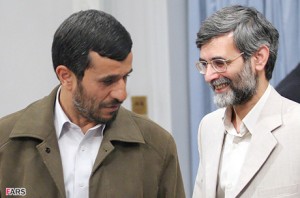Iran: Preventing Tehran from "Going Nuclear" (Ramazani)
 Tuesday, March 30, 2010 at 7:26
Tuesday, March 30, 2010 at 7:26  R.K. Ramazani, one of the leading scholars on Iranian foreign policy, writes for the Charlottesville Daily Progress:
R.K. Ramazani, one of the leading scholars on Iranian foreign policy, writes for the Charlottesville Daily Progress:President Obama’s greetings to Iran on March 20 on the occasion of the Iranian New Year (Nowruz) rekindled the hope that the United States is still interested in settling its nuclear dispute with Iran through negotiations.
The hope for a new chapter in U.S.-Iran relations began on 1 October, when for the first time since the Iranian Revolution in 1979 the two countries engaged in direct negotiations over the nuclear issue at Geneva.
Iran’s Nukes: False Alarm Journalism (Sick)
UPDATED Iran’s Nukes: The Dangerous News of The New York Times
Alas, three major factors subsequently dampened that hope and increased the tensions between the two countries. First, Iran and the United States disagreed on the amount of Iranian enriched uranium to be shipped to Russia and France for further processing in return for 20 percent enriched uranium needed by Iran for medical purposes. Second, Iran proceeded to enrich uranium to that level on its own.
Third, as seen from Washington, the crisis that followed Iran’s presidential election of 12 June caused Tehran to send mixed messages to Washington because of the rift in the ranks of the Iranian religious and political elites.
Obama’s New Year message, however, is more than a restatement of his commitment to engaging Iran. It posed a serious question to Iran for the first time. He asked Iranian leaders: “We know what you are against, now tell us what you’re for."
The President claimed that Iranian leaders were “unable to answer that question” because Iran had refused to accept fully the International Atomic Energy Agency-brokered proposal of October 2009 on the nuclear issue. Despite media misrepresentation, Iran had not rejected the proposal. It had made a counterproposal, which the United States refused to accept.
To address the President’s question, Iran’s nuclear program must be placed in the context of Iran’s principle foreign policy goals because Iran’s nuclear program is meant to serve these goals.
The first goal is to protect Iran’s political independence and to defend its national security against any foreign attack. The second goal is to project Iran’s influence in the Middle East. Global powers such as the United States seek to create an international environment favorable to their national interest, while medium powers like Iran try to make their regional environment safe.
The Iranian people, as well as their government, claim that they do not seek to achieve these goals by means of nuclear weapons. According to the American World Public Opinion Organization’s report of 7 April 2008, 58 percent of Iranians believe nuclear weapons violate the tenets of Islam and at the same time 81 percent consider “it is very important to have full fuel-cycle program” for peaceful purposes. That organization’s survey of 3 February showed that even the opponents of the government of President Mahmoud Ahmadinejad are “strongly committed to Iran’s nuclear program“.
A majority of the Iranian people and their government also claim that they seek to project influence, not hegemonic power, in the Middle East. According to the AWPOO’s report of 7 April 2007, Iranian people want their government to cooperate with, not to dominate, other countries of the Middle East.
If neither the Iranian government nor the Iranian people want nuclear weapons at the present time, does that necessarily mean they will not go nuclear in the future? According to the U.S. National Intelligence Estimate of 2007, Iran is keeping its options open.
The key question therefore is under what circumstances Iran would likely opt to weaponize nuclear energy? If Iran feels its national security is under present and imminent threat of military attack, it is reasonable to assume it would seek to acquire the level of nuclear capability that is necessary for quick diversion to nuclear weapons.
Such an attack could presumably be launched by the United States so long as it insists that all options are on the table. Defense Secretary Robert M. Gates, however, is skeptical about the effectiveness of striking Iran’s nuclear facilities. He thinks a military attack might only delay its nuclear progress for a couple of years.
Moreover, at the moment the United States is seeking to impose new sanctions on Iran that are tougher than the previous ones. Sanctions by the United Nations Security Council, however, would require the consent of Russia and China. They, especially China, would prefer to continue negotiating with Iran, and the effectiveness of even more biting sanctions is highly debated.
The time is now for Washington to reopen negotiations with Iran. The current U.S. dual-track approach --- tougher sanctions and threats of military attack combined with negotiations --- is apt to degenerate into a one-track strategy of confrontation with Iran if the present tensions escalate even further. That would likely end the prospects of negotiating with Iran in the future. That would be the surest way to a self-fulfilling prophecy - driving Iran to seek national security in nuclear weapons.
Such a development would damage the United States’ interest in non-proliferation of nuclear weapons and prevention of a nuclear arms race in the Middle East, and it would scuttle the United States’ efforts to stabilize Iraq and Afghanistan toward the goal of withdrawing the bulk of the U.S. forces from these countries.
Confrontation with Iran could also lead to a third war front in the volatile Middle East with catastrophic consequences, including the disruption of the flow of Persian Gulf oil supplies to world markets resulting in an unprecedented rise in oil prices worldwide.
Most tragically, it would destroy the prospects of the pro-democracy movement of the Iranian people. If the Iranians feel their country is facing military attack they will rally around the flag, however much they may oppose their government.


